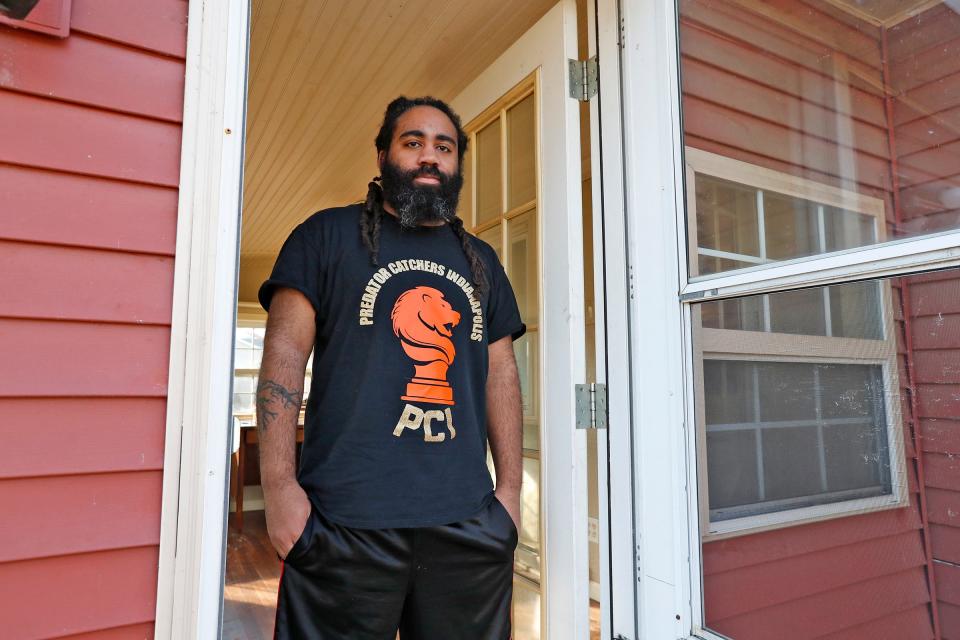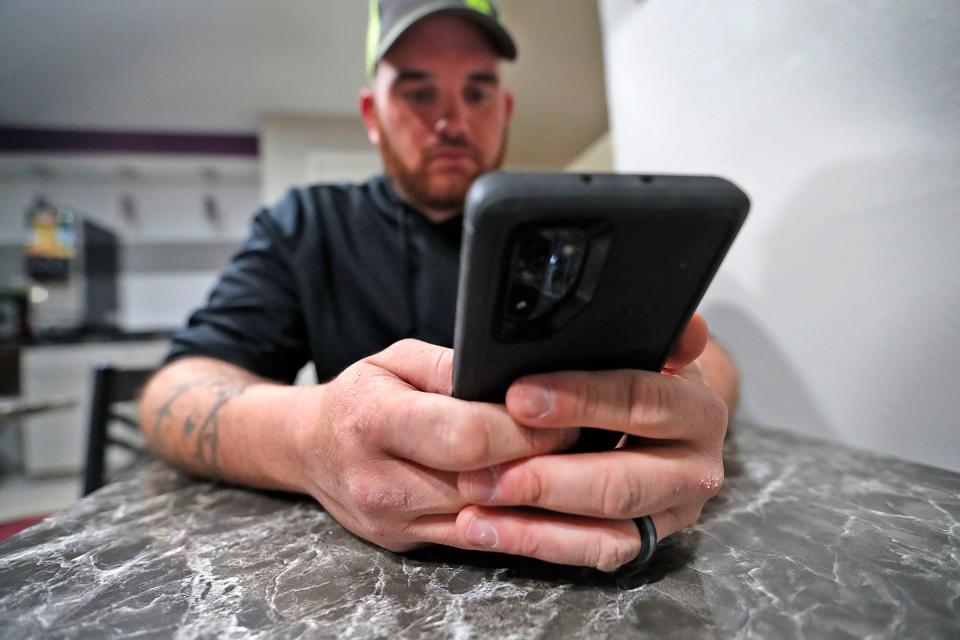These civilians hunt child predators. Expert warns they're 'playing with fire.'
INDIANAPOLIS — The confrontation begins at a side door of Lebanon Senior High School.
Viewers watched via Facebook Live as a woman approached the school, about 40 minutes northwest of downtown Indianapolis, and was greeted by Brian J. Boyer, a band teacher who, in that moment, was allegedly waiting for a 14-year-old girl to meet him for sex.
“Do you wanna come out and talk to me for a minute?” the woman asked.
“Basically, I brought you out here ‘cause we know who you are, I’m definitely not 14, you’ve definitely been talking to a decoy,” the woman said while walking with Boyer into the nearby parking lot.
The nearly 20-minute video is one of dozens posted to the PCI: Predator Catchers Indianapolis Facebook page. Their confrontation with Boyer was eventually interrupted by the school’s principal, who directed the decoy and Eric Schmutte, the group’s founder, to take their complaints to the district’s administration office.
Within hours of the encounter being streamed on Facebook, Lebanon Police announced Boyer’s arrest and the school district placed him on administrative leave. Boyer, whose job was terminated Jan. 29, is charged with one count of child solicitation.
CDC data: Young Black men and teens are killed by guns 20 times more than their white counterparts
Schmutte and the decoys working with PCI are part of a wider network of online sleuthing groups throughout the state.

'Vigilantes' just want to help. But there are risks.
Schmutte, 34, said he started his group after becoming outraged that child predators aren't held fully accountable for their actions.
“The way I see it, the justice system is not doing what it needs to do as far as locking up these guys and giving them actual sentences,” he told IndyStar, part of the USA TODAY Network. “So, us exposing them is the next best thing so people can at least know that these guys are predators.”
As his audience has grown — the video of his confrontation with Boyer has over 250,000 views — Schmutte said he's gotten pushback from some who say he's posting videos for attention.
"It's very insulting for people to tell us that we're doing it for the views or the clout, just to be famous or whatever," he said. "Because we put a lot of work into what we do and we take it very seriously."
Yet, there's another side to this picture: However noble their intentions, this kind of internet detective work carries significant legal and safety risks.
Online citizen groups hunting for potential predators is by no means a new phenomenon, but it's often discouraged by law enforcement due to safety concerns for both the citizen investigator and their "catch." In several instances across the country — including the case that contributed to the cancellation of Dateline NBC's "To Catch a Predator" — subjects have died by suicide after being confronted by investigators.
By no means a new phenomenon: How private citizens become digital detectives
And their work will not always be rewarded. While some law enforcement agencies will take their screenshots and videos as tips to investigate, others have outright said they will not accept any information from the groups.
One such prosecutor, Holly Hudelson of Orange County, told IndyStar in a written statement that her office is aware of Austin Spain, the one-man team behind the Bedford Predator Patrol, about 90 minutes south of Indianapolis, and said that unlike a police investigation, none of the information he presents can be used for prosecution.
"The vigilante's actions in ambushing an individual in this way causes great risk to the parties and the public," she said. "These actions make the community less safe, by allowing these alleged predators to avoid the possibility of a conviction by tainting a case from the start."
Spain told IndyStar that although his page attracts thousands of followers, he's not motivated by clicks.
"To me, it's not about anybody knowing what I'm doing," Spain said, "it's about making the world safer for our kids."
Victor Vieth, chief program officer of Zero Abuse Project and founder of the National Child Protection Training Center, told IndyStar that private citizens may not have a complete understanding of how a predator’s mind works — or the danger and gravity of the situation they’ve created.
"Even a lot of detectives are not well-trained on all of these nuances, and it’s hard for me to believe your average layperson is properly educated," Vieth said. “They’re playing with fire."
'This is the worst of the worst'
Neither Schmutte nor Spain has law enforcement training — Schmutte is a welder and Spain works in electrical construction. They're conducting these investigations in their free time, for free.
Spain, 29, said he was inspired to begin hunting would-be predators after growing concerned that men who assault underage girls sometimes get a "slap on the wrist."
"This is the worst of the worst, you know. Anybody that can do something to a child, in my opinion, is just the bottom of the barrel," Spain said. "Because what they’re seeing as a sexual pleasure to them is something that’s going to ruin a child’s life.”
Since starting this work late last year, Spain said he's personally met at least 30 men and said recent catches have contributed to arrests in two counties.
Here's how it works: Members of these groups create fake, "decoy" dating or social media profiles and, once connected with someone, share their decoy age. The conversation either ends or continues and eventually becomes sexual, Spain and Schmutte said, at which point they'll agree to meet, only to reveal their true identities and confront the person while streaming on Facebook Live.

For Spain, it's as easy as creating decoy Facebook pages using photos of adult female friends who he said have given him permission to use their images. One decoy page reviewed by IndyStar shows a young woman who says she's a student at a Bedford high school who likes reading. There's nothing outwardly provocative about the page.
Spain doesn't send friend requests, he said, nor does he initiate conversations. He lets the requests come to him. When he spoke to IndyStar on Jan. 22, Spain said one of his decoy pages had around 900 pending friend requests. Typically, he sorts through requests and messages, deleting those that are obviously fake or out-of-state. Then, it's just a matter of responding to that first message.
He'll respond with a "hey," and let the person drive the conversation from there. Even when the person begins sending sexual messages, Spain said he tries to steer the conversation toward a different topic.
"That kind of gauges how the rest of the conversation is gonna go," he said, "because a lot of times they’re very persistent and they want to keep talking about it."
In one exchange from December reviewed by IndyStar — a conversation between Spain and one of his first catches — a man asked the decoy about herself, at which point she said she was nearly 16 and had a previous boyfriend who was 46, but he had recently died in an accident.
The man messaged the Spain's decoy account suggesting she must like grown men, to which she responded "Lol well I only date older men."
The conversation continued, with the man offering to pay half of the cost of a motel room and split a dose of ecstasy, saying, "it get u high but bring the freak out of you."
As captured on Facebook Live, when confronted at an area Walmart on Dec. 6, the man walked out of the store without acknowledging Spain's accusations. The man, Willie Richardson, now faces one count of child solicitation.
Tech: YouTube to launch supervised accounts for kids under 13 years old
'Not only illegal, it's sick'
About two-thirds of the people Spain communicates with will end the conversation when they learn the girl's age, he said, so "there's still a lot of good people in this world."
"But there’s still 30% that are willing to take that risk," he said. "And when you have 100 people a day messaging you, 30% is a lot.”
An IndyStar review of one of his decoy accounts found he received around 600 messages within the first 10 days of January. By early February, that account had over 750 pending friend requests.
Posing as the girl, he eventually agrees to meet with these men in a public place.
It's one thing to exchange messages, but it's another to prove that the men were willing to go forward with the proposed sexual encounter, Spain said, and that piece of evidence is likely to be most helpful to police and prosecutors.
"When they show up," Spain said, "that shows the intent."

Spain tries to stay even-keeled, staying mindful of his volume and language. He just wants to give them the opportunity to respond to the allegations.
"I’m non-confrontational," Spain said, "so when I talk to somebody — although what they’re doing, to me, is disgusting — I still talk to them like a human being. I still show them respect."
After the "catch," he'll go home and put together a file of screenshots and photos he's received to turn over to police. But that doesn't always result in an arrest or prosecution.
"My goal from the beginning was to try to get these guys arrested and prosecuted," he said. "But if it’s just exposing them and that’s all I can do, then that’s all I can do."
Coronavirus Watch newsletter: Sign up for daily updates right in your inbox
Tiptoeing legal boundaries
Vieth, the training expert and former prosecutor, said law enforcement professionals who go undercover understand there are legal parameters to what they can say and do.
Then comes the question of the subject's intent. A prosecution has to be able to prove the offender's desire was to maltreat children.
Experts used to divide sex offenders into two groups: preferential, those who prefer having sex with children, and opportunistic, those who wouldn't act unless the opportunity presented itself. However, Vieth said, each offender's mind and motivation are far more complex than binary, meaning law enforcement and health professionals have to work to understand what is driving each individual's actions.

“There's this built-in defense that it wasn’t really the offender who was choosing to go down this path, it was really planted in their mind, encouraged by the person who’s dialoguing with them," Vieth said. "So it’s a very fine line to be careful not to cross.”
Another issue to consider is that of safety. The subjects of the catch may feel trapped and decide to harm themselves or others. Their work may inspire others to engage in "vigilante justice." The work they turn over to police may not be prosecutable. So, is it worth the risk?
"Eventually," Veith said, "those things will overpower any of the good anecdotes."
Vieth encourages private citizens who want to engage in prevention efforts to reach out to professional organizations for training, become involved in local advocacy groups and educate their children and other children about what they can do to stay safe.
"There’s no doubt that citizens can play a role in protecting children from abuse," he said. "The question is how do they do it in a healthy and lawful way?"
The greater good
There's not an easy way to quantify how many of these cases Indiana law enforcement have taken on or thrown out.
Neither Spain nor Schmutte tracks their catches to know what happens once they turn the information over to law enforcement.
Spain, who said he's studied Indiana code regarding child solicitation and done his research to avoid entrapment, said people shouldn't be quick to judge him for the work he's doing online.
"Before anybody says that what I’m doing could potentially hurt a prosecution, I think they should look at what I’ve done and look at the facts that are presented and see if it actually would hurt the prosecution," Spain said. "Because I’m fairly positive that I’ve stayed between all guidelines."
Both Schmutte and Spain told IndyStar they'd be willing to undergo law enforcement training to ensure they're safe, effective and able to collaborate with local agencies. Until then, their sleuthing will continue, because their priority is the greater good.
"I don’t feel like I’m doing anything that I couldn’t do with any other law that’s being broke," Spain said. "If I saw somebody robbing a bank, I would be more than glad to pull my phone out and record it and hand the evidence over to the police."
Follow reporter Holly Hays on Twitter: @hollyvhays
More: Biden administration to deliver more than 25 million masks to health centers, food pantries
Ahmaud Arbery was killed at 25: A year later, Black men who see themselves in him mourn his loss
This article originally appeared on Indianapolis Star: Indianapolis predator catchers hunt offenders, experts urge caution

 Yahoo Movies
Yahoo Movies 
